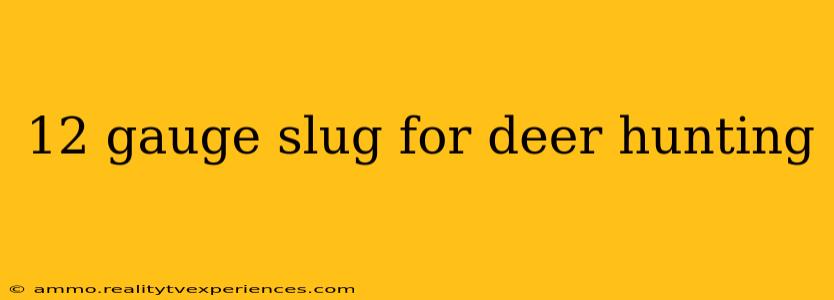Deer hunting with a 12-gauge shotgun presents a unique set of challenges and opportunities. While many hunters rely on rifles, the 12-gauge slug offers a powerful and versatile alternative, particularly in tighter woods or for those who prefer the shotgun platform. This guide will delve into the specifics of choosing the right 12-gauge slug for a successful deer hunt.
Choosing the Right 12 Gauge Slug: Key Considerations
Selecting the appropriate 12-gauge slug depends on several factors, including your shotgun, hunting conditions, and personal preferences. Let's break down the critical aspects:
1. Slug Type:
Several types of 12-gauge slugs exist, each with its strengths and weaknesses:
-
Rifled Slugs: These slugs feature rifling (grooves) along their body, providing excellent accuracy and long-range potential. They are generally preferred for shots exceeding 50 yards. Accuracy is greatly enhanced with rifled shotgun barrels, though they are effective with smoothbore barrels as well, albeit at a slightly reduced accuracy.
-
Sabot Slugs: These slugs utilize a plastic sabot (carrier) that helps them achieve greater velocity and accuracy. The sabot separates from the slug in flight. They often exhibit superior accuracy compared to standard rifled slugs, especially at longer ranges. Sabot slugs are generally best used in rifled shotgun barrels.
-
Foster Slugs: A classic design, Foster slugs feature a blunt nose and are generally less accurate than rifled or sabot slugs. They are often less expensive but offer adequate performance for closer-range shots. These can be used in smoothbore barrels.
2. Gauge and Shot Weight:
While we're focusing on 12-gauge, it's worth noting that slug weight affects performance. Heavier slugs generally exhibit better penetration and energy retention, especially at longer ranges. However, recoil increases with heavier slugs. A good balance is crucial – find a weight that suits your firearm and your ability to manage recoil.
3. Barrel Length and Choke:
The length of your shotgun barrel significantly impacts accuracy and velocity. Longer barrels typically provide greater accuracy and muzzle velocity. While most slug barrels are cylinder bore, some might be slightly constricted. Check your barrel's specifications to understand the best slug type for it.
4. Range and Hunting Situation:
Your hunting conditions dictate the ideal slug type and range. For shots within 50 yards, a Foster slug might suffice. However, for longer shots, rifled or sabot slugs are significantly more accurate and provide better energy transfer for a clean kill. Always consider the ethical implications of shot distance and choose a slug appropriate for your hunting situation.
Factors Beyond the Slug Itself
Effective deer hunting with a 12-gauge slug requires more than just the right ammunition; consider these additional aspects:
-
Sight System: A quality sight system, whether ghost ring sights, scope mounts, or even a bead sight, is crucial for accurate shooting, especially at longer ranges.
-
Practice: Before your hunt, ample practice is essential to develop proficiency and ensure you can consistently hit your target. Practice with your chosen slug type and at various ranges that might be encountered during the hunt.
-
Shot Placement: Ethical and successful deer hunting relies on precise shot placement. Aim for vital areas such as the heart and lungs. A poorly placed shot can result in a wounded animal, which is unethical and undesirable.
-
Safety: Always prioritize firearm safety, both for yourself and others. Follow all relevant safety guidelines and regulations.
Conclusion:
Selecting the right 12-gauge slug for deer hunting requires careful consideration of several factors. By understanding the differences between slug types, considering your shotgun's specifications, practicing diligently, and emphasizing safe hunting practices, you can significantly increase your chances of a successful and ethical hunt. Remember to always consult your state's hunting regulations regarding legal ammunition and hunting practices.

